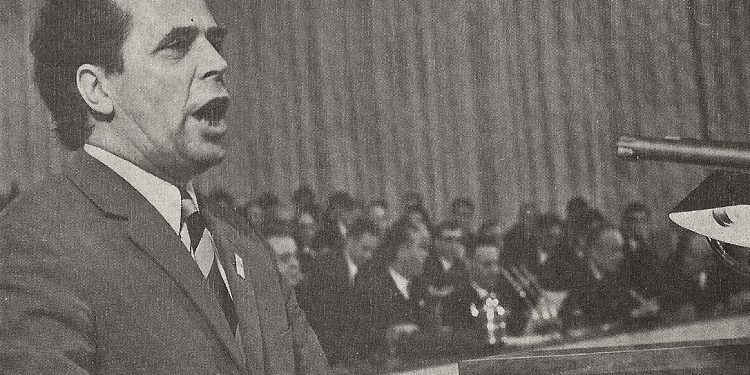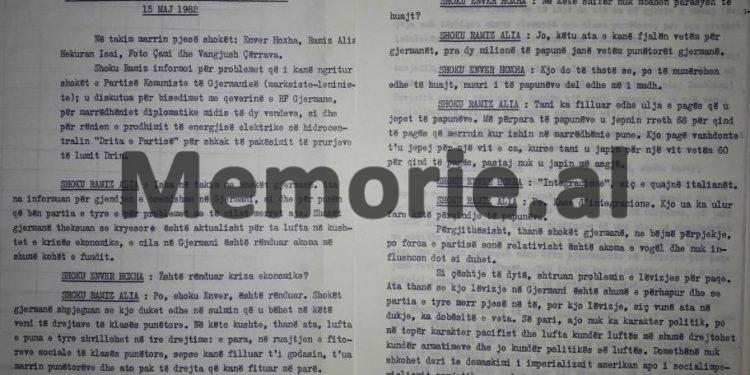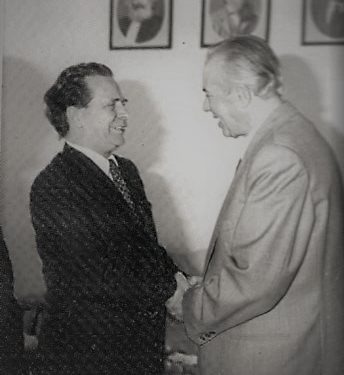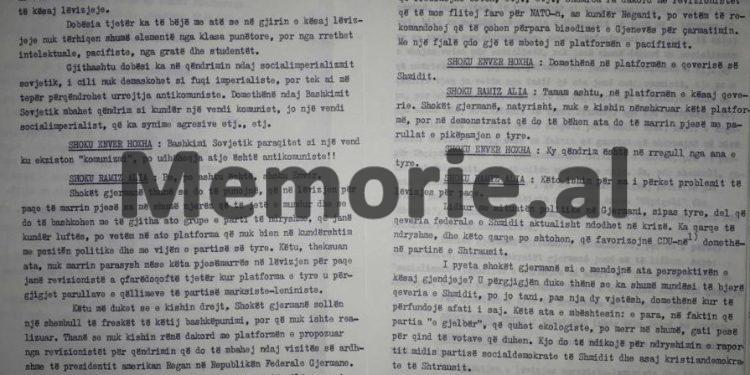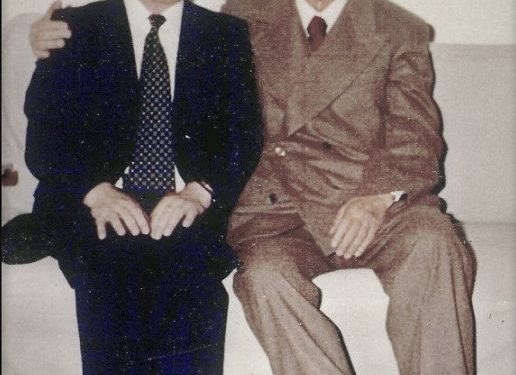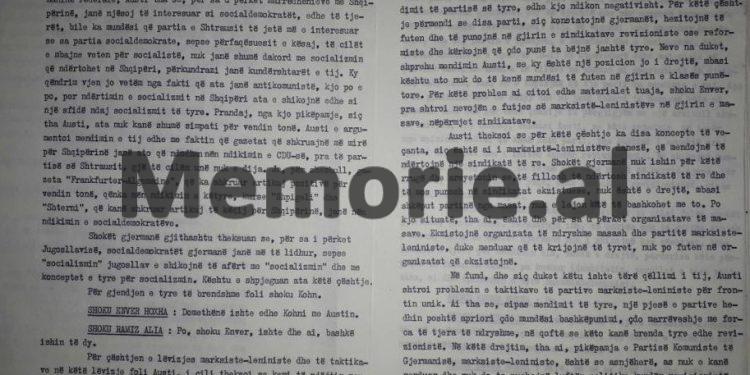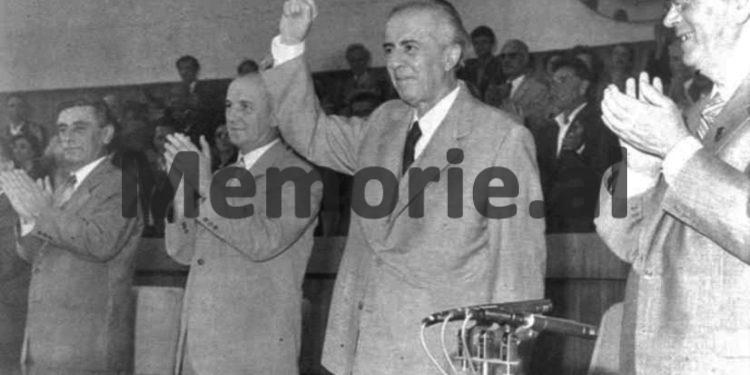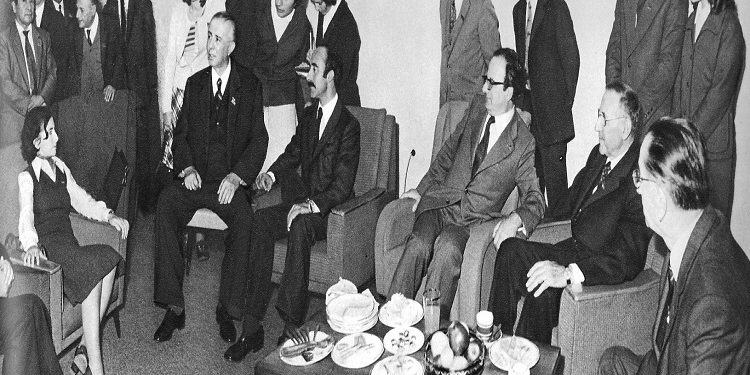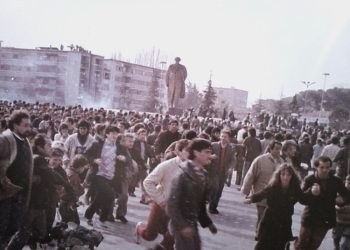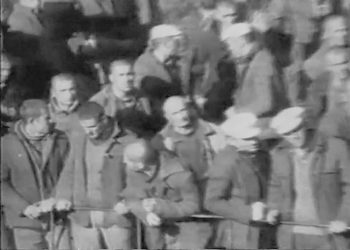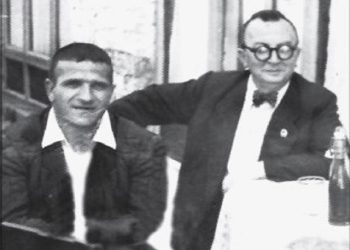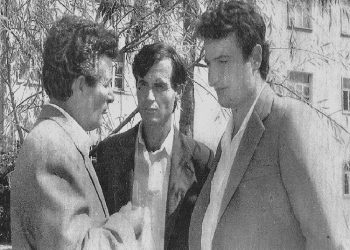Dashnor Kaloçi
Second part
Memorie.al/ publishes some archival documents extracted from the Central State Archive in Tirana (Fund of the former Central Committee of PPSh), which contain the acronym “Secret” and “Top Secret” and belong to a period from January from 1982 until September 1983, where there is a voluminous file with minutes of meetings of the Secretariat of the Central Committee and the Political Bureau of the Central Committee of the PPSh, meetings which were chaired by its General Secretary, Enver Hoxha, where they assisted: Ramiz Alia, Adil Çarçani, Manush Myftiu, Hekuran Isai, Rita Marko, Pali Miska, Hajredin Çeliku, Haki Toska, Simon Stefani, Lenka Çuko, Muho Asllani, Vangjel Çerrava, etc., as the main topic is analysis about the “hostile activity” of Mehmet Shehu and his close collaborators, from Fadil Paçrami, Todi Lubonja, Beqir Balluku, Petrit Dume, Hito Çako, Abdyl Këllezi, Koço Theodhosi, Kiço Ngjela, Vasil Kati, Kadri Hazbiu, Fiqret Shehu, Feçor Shehu, Mihalla q Ziçishti, Llambi Peçini, etc. In the file available to Memorie.al, in addition to the analysis of the “hostile activity of the police agent Mehmet Shehu and his associates Beqir Balluku and Kadri Hazbiu”, in the meetings of the Political Bureau and the daily meetings of the Secretariat of the PPS Central Committee, are analyzed also the activity of the Ministry of Internal Affairs and State Security, with its agency and collaborators, inside and outside the country, the reports and relations of the Albanian state with different countries of the world, such as: the USA, the Soviet Union, West Germany, England, Spain, Italy, as well as those with neighbors, such as Greece and Yugoslavia and the demonstrations in Kosovo, how the world press presented Socialist Albania, the talks with West Germany about the War reparations payments, meetings and conversations with party leaders Marxist-Leninists from different countries of the world, such as Ernst Aust, Zhoao Amazonas, Fosko Dinuçi, etc., regarding the “suicide of Mehmet Shehu”, the problems of Polish immigration Albanian refugees, in different countries of the world, and the change of the exchange rate of the dollar in the remittances, which they made to their relatives in Albania, up to numerous economic problems, from heavy industry, hydropower plants on the cascade of the river Drin, energy import and export, etc., etc.
Continues from last issue
The document with the minutes of the daily meeting of the secretaries of the Central Committee of the PPSh, held on May 15, 1982, regarding the meeting of Ramiz Ali with Ernst Aust, chairman of the Marxist-Leninist party of West Germany
DAILY MEETING OF SECRETARIES OF THE CENTRAL PARTY COMMITTEE MAY 15, 1982
Comrades: Enver Hoxha, Ramiz Alia, Hekuran Isai, Foto Çami, and Vangjush Cërrava take part in the meeting. Comrade Ramiz informed about the problems raised by the comrades of the Communist Party of Germany (Marxist-Leninist), where it was discussed about the talks with the government of the Federal Republic of Germany, about the diplomatic relations between the two countries, as well as about the decline in electricity production in the “Drita e Partisia” hydropower plant, due to the reduction of flows in the river Drin.
COMRADE RAMIZ ALIA: I was in a meeting with German friends. They informed me about the internal situation in Germany, as well as about the work that their party does for various problems. The German comrades emphasized that the main thing for them is the war in the conditions of the economic crisis, which in Germany has become even more difficult recently.
COMRADE ENVER HOXHA: Has the economic crisis worsened?!
COMRADE RAMIZ ALIA: Yes, Comrade Enver, it has gotten worse. The German comrades explained that this can also be seen in the attack that is being made in this country, on the rights of the working class. In these conditions, they emphasized, their work and struggle takes place in three directions. The first, in preserving the social victories of the working class, because they have begun to strike and take away from the workers the few rights they had won before.
Second, in maintaining the standard of living, which is falling due to the increase in prices, which is greater than the increase in wages and the difference between them only in the last months, is 3 percent to the detriment of the real wage. The third, in curbing unemployment because, somewhat officially, it is said that the number of unemployed in Germany is 1 million and 200 thousand workers, effectively now there are over 2 million unemployed.
COMRADE ENVER HOXHA: In this figure, foreigners are not taken into account?!
COMRADE RAMIZ ALIA: No, here they are only talking about Germans, so the two million unemployed are only German workers.
COMRADE ENVER HOXHA: This means that if foreigners are also counted, the number of unemployed is even higher.
COMRADE RAMIZ ALIA: Now, the salary reduction given to the unemployed has started. Previously, the unemployed were given 68 percent of the salary they received when they were employed. This salary continued to be given to you for almost two years, but now for 1 year they give you 60 percent of the salary and then they don’t give you anything.
COMRADE ENVER HOXHA: “Integrations” as the Italians call it.
COMRADE RAMIZ ALIA: Yes, ‘casa d’integrazione’. This has completely reduced the percentage of the unemployed. The German comrades emphasized that, in general, they make efforts, but the strength of our party is still small, and it cannot influence properly. As a second issue, they posed the problem of the peace movement. They said that this movement in Germany is very widespread and that their party participates in it.
But this move, they said, has its weaknesses. First, it does not have a political character and rather has a pacifist character since their war is directed against the arms race and not against war policies. That is, it does not go as far as exposing American imperialism or Soviet social-imperialism, but only acts against the arms race.
COMRADE ENVER HOXHA: So they only talk about balancing the armament of the superpowers?!
COMRADE RAMIZ ALIA: Yes, Comrade Enver, and this is one of their weaknesses. The other weakness is that within this movement, not many elements from the working class are attracted, but rather there are intellectuals, pacifists, women, and students.
There is also another weakness in terms of the attitude towards Soviet social-imperialism, which is not unmasked as an imperialist power, but instead focuses on anti-communist hatred. That is, towards the Soviet Union, an attitude is maintained as towards a communist country, and not towards a power that has aggressive goals, etc.
COMRADE ENVER HOXHA: The Soviet Union was presented to us as a country where “communism” exists, while the leadership there is anti-communist?!
COMRADE RAMIZ ALIA: Yes, yes, that is Comrade Enver. The German comrades said that they will work so that as many people as possible participate in the movement for peace and that they will join all those groups or parties that are against the war, but only on those platforms that do not contradict their political position and party line. Here, they emphasized, they do not take into account whether these participants in the peace movement are revisionists or anything else, when their platform corresponds to the slogans and positions of the Marxist-Leninist party. Here it seems to me that they were right.
They brought a fresh example of this cooperation, but which had not been realized. They said that they did not agree with the platform proposed by the revisionists for the position to be taken towards the upcoming visit of American President Reagan to the Federal Republic of Germany. For this purpose, a meeting was organized, in which 800 participants from various organizations took part, such as ecologists, pacifists, clergy, revisionists, and all the others in a row like these.
We, our German comrades informed us, did not agree with them because, while we wanted slogans raised against NATO, against the aggressive policy of American imperialism, against the armament of the superpowers that endanger the world, the majority agreed that there should be no talk of NATO, or against Reagan, but only to recommend the Geneva talks on disarmament. In a word, everything would remain within the framework of pacifism.
COMRADE ENVER HOXHA: That is, on the platform of Shmid’s government?!
COMRADE RAMIZ ALIA: Exactly, on the platform of this government. The German comrades, of course, had not signed this platform, but in the demonstrations that will take place they will participate with their banners.
COMRADE ENVER HOXHA: This attitude is okay on their part.
COMRADE RAMIZ ALIA: These were, in terms of the problem of the movement for peace. Regarding the political situation in Germany, according to them, it appears that Shmid’s federal government is currently in crisis. There are various constituencies, and these constituencies are increasing, that favor the CDU, i.e. Strauss’s party. I asked the German friends, how do they think about the perspective of this situation?!
They responded by telling me that there is a good chance that Shmid’s government will fall. But not now, but after a couple of years when her term ends. They support this because according to them the Ecological Party “Greens” is getting almost 5 percent of the necessary votes. This will affect the change of relations between the Social-Democratic Party of Shmid and the Christian-Democratic Party of Strauss.
The second, Gensher as leader of the Liberal Party, has started to lean more towards Strauss. Apparently, he considers it necessary to make a change in his current position, so there is a possibility that he will pass from this side. Talking about the issue of our relations with Federal Germany, Austi said that, as far as relations with Albania are concerned, both sides are equally interested.
There is even a possibility that Strauss’s Christian Democrats are more interested than the Social Democrats, since the representatives of this group who call themselves Socialists, do not agree with the socialism that is being built in Albania, on the contrary, they are its opponents. This attitude comes from the fact that they are not only anti-communist, but they see the construction of socialism in Albania as a challenge to their own socialism. Therefore, from this point of view, as Austi said, they do not have much sympathy for our country.
Austi argued his opinion with the fact that the newspapers that write better about Albania are the ones under the influence of the CDU, that is, Strauss’s party, which I did not know. For example, the newspaper “Frankfurter-Allemaine”, which has written positive articles about our country, is under their influence, while “Der Shpigeli” and “Sterni”, which have written bad articles about our country, are under their influence the influence of social democrats.
The German comrades emphasized that, as far as Yugoslavia is concerned, the German Social-Democrats are more connected to it, since they see their socialism as close to Yugoslavian socialism. This is how they explained the matter. Comrade Kohn also spoke about their internal state.
COMRADE ENVER HOXHA: I mean, Kohni was also with Austin?!
COMRADE RAMIZ ALIA: Yes, Comrade Enver. He was there too, they were both together. On the issue of the Marxist-Leninist movement, and the tactics in this movement, Austi spoke, who emphasized that we have the same opinion that the influence of the Marxist-Leninist parties on the masses is relatively small and it is noticed that it is not growing rapidly. Of course, he said, several factors play a role here, and he mentioned, among others, the betrayal of the revisionists, the disappointment suffered by the masses of people, the working class, etc.
Then he got into some problems of the various tactics of the Marxist-Leninist parties, which in their opinion also has a negative effect. On this issue, he mentioned that there are some parties, as the Germans find, are reluctant to enter and work in the bosom of revisionist or reformist unions, and demand that they do every action outside of them. Austi expressed the opinion that this attitude did not seem fair to them, since, in this way, they will not have the opportunity to join the working class.
For this problem, he also quoted parts of your materials, Comrade Enver. So he laid out the need to introduce Marxist-Leninists into the masses, through trade unions. Ernst Austi emphasized that there are some special concepts on this issue, such as that of the Danish Marxist-Leninists, who are thinking of building a new trade union. The German comrades were not in favor of this path and they reasoned that starting to change a new trade union and not working with the existing trade unions is not right as it separates the party from the masses and does not allow them to join them. .
This situation, he said, also applies to mass organizations. There are various mass organizations, and the Marxist-Leninist parties, trying to create their own, are not getting into existing organizations. In the end, and apparently this was his whole purpose, Austi posed the problem of the tactics of the Marxist-Leninist parties for the united front? He said that, in their opinion, some parties reject a priori, any possibility of cooperation, any agreement with different forces, if they have revisionists among them.
In this direction, he said, the point of view of the German Marxist-Leninist Communist Party is that they have never thought and will not stop the political war against the revisionists, and even emphasized that it will intensify it. But in this struggle, all the driving forces of the masses must participate, be they revisionists, but maintaining the party’s point of view and platform.
Austi told me that on this issue, there have been some misunderstandings with the counterpart parties, as he has seen that they are not flexible, so much so that they have accused the Germans of being right-wing, and of lack of consequence in the fight against revisionism, etc.
In particular, he emphasized, the parties of Denmark, Canada, and Spain have spoken against us. Even the Communist Party of Spain has distributed materials in our party, accusing us of being right-wing opportunists. Of course, he said, we understand that this party has its own opinion. She has published it in the press, and we agree to publish this in our paper, and on this matter we have answered you with a very correct article.
So I think that these derive rather from the sectarian opinion that these parties have, and from their narrow understanding of revisionism. These were the summarized issues, about which the German comrades, Comrade Enver, spoke to us. My impression, at least from all that was said, is that the German comrades do not take a bad view of matters. Even their tactics, in my opinion, are right, as long as they try to reach the masses, without losing their identity, their political slogans, and their Marxist-Leninist opinion.
COMRADE ENVER HOXHA: Yes.
COMRADE RAMIZ ALIA: But the other Marxist-Leninist parties that were mentioned, especially the Spanish, see this problem a little narrowly and are sectarian.
COMRADE ENVER HOXHA: Well, as far as we know, even the Spanish themselves are making such a policy with the masses.
COMRADE RAMIZ ALIA: They do such a thing, especially with other forces.
COMRADE ENVER HOXHA: With what other forces?!
COMRADE RAMIZ ALIA: For example, with the old former socialists.
COMRADE ENVER HOXHA: Well, these old former socialists, what are they now?!
COMRADE RAMIZ ALIA: Forces that have not joined today’s Socialist Party. With Carrillo’s party, or with Gonzalez’s party, these Marxist-Leninists do not speak at all; they do not want to agree with them on any action, such as on the issue of salaries, on unemployment, on peace, on the issue of NATO bases in Spain, etc.
COMRADE ENVER HOXHA: But when these forces demonstrate against the reduction of wages, the Marxist-Leninist forces do not participate in them?!
COMRADE RAMIZ ALIA: Yes, they participate, but not with them.
COMRADE VANGJUSH ÇARAVA: Do they organize separate actions?!
COMRADE RAMIZ ALIA: Yes, separately.
COMRADE ENVER HOXHA: How, they demonstrate alone?!
COMRADE RAMIZ ALIA: Yes, only.
COMRADE ENVER HOXHA: Are you well informed about this?! I mean, when 800,000 people come out and demonstrate in the streets, the Marxist-Leninists don’t come out at all?!
COMRADE RAMIZ ALIA: No, they can come out, but not with the slogans and common platform with other forces.
COMRADE ENVER HOXHA: They may not have a common platform, and even the German comrades have not expressed a common platform…!
COMRADE RAMIZ ALIA: No, they said that they also have a common platform with other forces.
COMRADE ENVER HOXHA: Yes, there are cases where they may not.
COMRADE RAMIZ ALIA: There are also such cases. For example, in the particular case they mentioned, they disagreed with the pacifist platform of other forces for opposing Reagan’s visit to the Federal Republic of Germany.
COMRADE ENVER HOXHA: Yes, they didn’t agree, that’s why they didn’t sign the platform.
COMRADE RAMIZ ALIA: They did not agree, and they will come out with their own slogans.
COMRADE ENVER HOXHA: In principle, the Marxist-Leninist forces must join the masses; otherwise they have no way of connecting with them.
COMRADE RAMIZ ALIA: That’s right, Comrade Enver.
COMRADE ENVER HOXHA: Yes, it depends on the circumstances and the specific conditions. If the Spanish revisionists, supporters of Carrillo and his friends are so discreet among the people, I think that the Spanish Marxist-Leninists would do well not to cooperate with them.
COMRADE RAMIZ ALIA: By taking this position, they do not want to discredit themselves and compromise with the revisionists.
COMRADE ENVER HOXHA: Posi, they can more easily go to a demonstration against Reagan, with a liberal conservative than, with Karriljo, who has been completely discredited, because he is a branded agent of the bourgeoisie within the working class. So the attitude that will be maintained depends on the situations.
COMRADE RAMIZ ALIA: That’s right.
COMRADE ENVER HOXHA: I think that in general, the German comrades have presented the issues correctly.
COMRADE RAMIZ ALIA: Comrade Enver seems to me the same way, in general they are right.
COMRADE ENVER HOXHA: As for how these parties will maintain relations between themselves, this is another matter. We maintain social relations with all these parties, and we express our opinion in principle when the friends of these parties present us with issues. Memorie.al
The next issue follows




